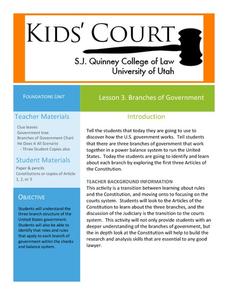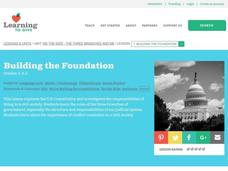Curated OER
Lesson 3: Branches of Government
Young historians climb through the three branches of the US government in the third lesson of this five-part series. While reading the first three Articles of the Constitution in small groups, children write facts on paper leaves...
iCivics
Congress
Through reading materials, worksheets, and a primary source activity, this resource provides an overview of the structure and powers of the legislative branch of government in the United States. Readings review how a bill becomes a law,...
Curated OER
The Role of the Executive Branch in the Lawmaking Process
Young scholars examine Article I, Section 7, and Article II, Sections 2 and 3, of the U.S. Constitution, explain the president's role in the lawmaking process, and define the term veto.
National Endowment for the Humanities
Lesson 4 James Madison: Internal Improvements Balancing Act—Federal/State and Executive/Legislative
Who has the power? The founding fathers asked the same question when the United States was formed. Learners explore issues that arose during Madison’s presidency that raised constitutional questions. Through discovery, discussion, and...
US House of Representatives
Legislative Trends and Power Sharing Among Hispanic Americans in Congress, 1977–2012
Bilingual education, voting rights, and Congressional redistricting come up often in the news. Explore these topics from another view—the perspectives of Hispanic members of Congress. Activities include an article with comprehension and...
American Bar Association
What Is Separation of Powers?
Who has the power? Scholars investigate the creation of the three branches of government in the United States Constitution. They analyze just why the framers created the branches the way they did.
Curated OER
Why Does Congress Work That Way?
Students discover the powers of Congress. In this legislative branch lesson, students examine the legislative process as they analyze Article I of the U.S. Constitution. Students consider the powers of Congress as they define the role of...
Curated OER
Legislative Branch
Learners analyze Article 1 of the Constitution. They respond to the Public Criticism E-Learning module.
Curated OER
Charting the Three Branches of Government
Students review CongressLink on the internet and study the branches of government. They work in groups to create charts showing the structure and functions of the three branches of government as outlined in the first three articles to...
Curated OER
The Three Branches of Government
Seventh graders discover details about the responsibilities of the 3 branches of government in the United States. In this checks and balances lesson, 7th graders view a SMART Board supported lecture that reveals the jobs of the...
iCivics
Mini-Lesson: Congressional Committees
How exactly do both houses of Congress come to a formal decision on an issue? Scholars research the use of congressional committees as part of the legislative process. By using current events to analyze information, they see the role...
American Constitution Society
Constitution in the Classroom: The Right to Vote
The system of checks and balances is integral to the functionality of the United States government. Learn more about the ways the three branches of the government work together—and about the limitations of their power—with an informative...
C-SPAN
Choice Board: Expressed and Implied Powers
Article 1, Section 8 of the United States Constitution expressly lists powers given to Congress. Over the years, lawmakers have expanded the enumerated powers to include powers implied by the list. To better understand the significance...
iCivics
Mini-Lesson: Filibusters
How long can you speak without stopping? Scholars analyze the concept of a filibuster in the United States Senate using an installment of the Legislative Branch series of mini-lessons. They research recent filibuster attempts in the...
Curated OER
Having the Last Word
Students discuss the influence of foreign languages in their everyday speech after reading an article from The New York Times on language legislation in Brazil. Students are divided into 4 groups in order to research languages spoken...
Curated OER
Hate-Crimes and Punishment
Students research and write about the effectiveness of hate-crime legislation in the United States
Curated OER
Taking From the Giving Tree
Young scholars explore the ways in which various American cities negotiate the protection of their "green infrastructure," gaining a broader understanding of proposed and enacted legislation as it relates to preserving and planting trees...
Curated OER
TE Activity: Pollution Politics
Students examine how a bill becomes a law in the US Congress. They investigate legislation about global warming. They determine the role of engineers as they educate Congress, the public and other government institutions about global...
Curated OER
The Role of the Executive Branch in the Lawmaking Process
Pupils research the Executive Branches role in making a law. In this law making lesson plan, students study the history of the Constitution and see how much power the President has in making a bill into a law. Pupils then research on the...
Curated OER
Lesson 2: The Constitution: Our Guiding Document
Explore the structure and content of the US Constitution in the second lesson of this five-part social studies series. A collection of activities, games, and videos complement a class reading of a document summarizing the US...
C-SPAN
Supreme Court Justices Research and Resumes
According to Article III, Section1 of the United States constitution, the only qualification one needs to be appointed to the Supreme Court is to demonstrate "good behavior." The president and Congress are given the power to determine...
Curated OER
Building the Foundation
Students understand the purpose of the judicial branch of government. For this judiciary lesson, students participate in exercises to understand how the court system works. Students complete activity sheets to develop understanding of...
National Constitution Center
Separation of Powers
Learners explore how the Constitution provides for separation of power and limited government, as evidenced by the three branches of government. They participate in role-playing situations, group discussions, and complete worksheets to...























